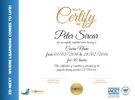Accessing and Sharing Information
Ed-Next
Summary
- Exam(s) / assessment(s) is included in price
Overview
Information technologies are letting companies communicate, share, and provide data access to workers, managers, suppliers, and customers in ways that were unthinkable just a few years ago. Three types of information technologies are used by managers and workers inside organizations to access and share information: executive information systems, intranets, and corporate portals. Information technologies like electronic data interchange, extranets, web services, and the internet let companies easily share data with external groups like suppliers and customers. Companies have also begun using information technologies to capture and share the knowledge of consultants, specialists, and experts with other managers and workers by using decision support systems and expert systems. Business managers are exposed to reams of information every day, some useful and some not, which in turn impacts the actions they take, the behaviors they exhibit, and the decisions they make. This course discusses the main ways that businesses and managers access and share information internally and externally.
Course media
Description
By the end of this course the learner will be able to:
- Recognize why managers need to access information
- Recall why managers need to share information
- Define internal access and sharing
- Define external access and sharing
- Identify ways managers share knowledge and expertise
You must make an 80% or higher on the final quiz to pass this online course. Once you pass the online course and complete your course survey, you will be able to print your certificate of completion from inside the course.
Who is this course for?
Anybody dealing with information
Requirements
Noprior qualification required
Career path
Application of principles learnt in this course
Reviews
Currently there are no reviews for this course. Be the first to leave a review.
Legal information
This course is advertised on reed.co.uk by the Course Provider, whose terms and conditions apply. Purchases are made directly from the Course Provider, and as such, content and materials are supplied by the Course Provider directly. Reed is acting as agent and not reseller in relation to this course. Reed's only responsibility is to facilitate your payment for the course. It is your responsibility to review and agree to the Course Provider's terms and conditions and satisfy yourself as to the suitability of the course you intend to purchase. Reed will not have any responsibility for the content of the course and/or associated materials.



